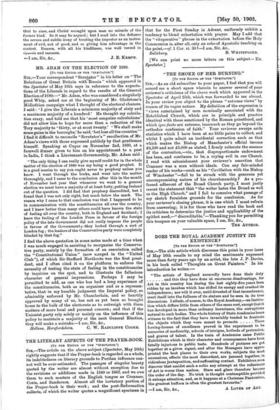MR. ADAM ON THE ELECTION OF 1880.
[TO THE EDITOR OF THE "SPECTATOR.")
SIR,—Your correspondent "Scrutator " in his lettei. on " The Relations of Great Britain witli Russia " which appeared in the Spectator of May 16th says in reference to the expecta- tions of the Liberals in regard to the results of the General Election of 1280:-" Mr. Adam, who was considered a singularly good Whip, asked me at the beginning of Mr. Gladstone's Midlothian campaign what I thought of the electoral chances. I said : ' I give the Liberals a minimum majority of sixty and a maximum majority of a hundred.' He thought my calcula- tion crazy, and told me that his most sanguine calculations' did not allow him to hope for more than a reduction of the Tory majority to thirty, or at most twenty.' We shall make some gains in the boroughs,' he said, ' but lose all the counties."' I find it difficult to reconcile " Serutator's " recollection of Mr. Adam's views with those expressed publicly by that gentleman himself. Speaking at Cupar on November 2nd, 1880, at a farewell dinner given to him on his appointment to a post in India, I think a Lieutenant•Governorship, Mr. Adam said :
" The only thing I can really give myself credit for in the whole matter of the election of 1880 was my being a good prophet. It is a good maxim to say you ought never to prophesy unless you know. I went through the books, and went into the matter thoroughly, and I came to the conclusion after this in the month of November last year that whenever we went to a general election we must have a majority of at least forty, putting Ireland out of the question. I did find that prophecy discredited, but I found that I was not only right, but much below the mark. The reason why I came to that conclusion was that I happened to be in communication with the constituencies all over the country, and I knew better than many others could have known the state of feeling all over the country, both in England and Scotland ; I knew the feeling of the London Press in favour of the foreign policy of the late Government did not really impress the people in favour of the Government they looked through a sort of London fog ; the leaders of the Conservative party were completely blinded by that fog."
I find the above quotation in some notes made at a time when I was much engaged in assisting to reorganise the Conserva- tive party, mainly by the formation of an association called the " Constitutional Union" (now merged in the " United Club"), of which Sir Stafford Northcote was the first presi- dent, and I often cited it o:i the platform to enforce the necessity of testing the state of feeling in the constituencies by inquiries on the spot, and to illustrate the fallacious character of general impressions. Perhaps I may be permitted to add, as one who has had a long experience of the constituencies, both as an organiser and as a represen- tative, that in my humble judgment the Imperial policy, so admirably enforced by Mr. Chamberlain, and so heartily approved by many of us, has not as yet been so brought home to the bulk of the electorate as to outweigh with them matters of more local and personal concern; and that if the Unionist party rely solely or mainly on the influence of this policy to maintain a majority at the next General Election, they will make a mistake.—I am, Sir, &c.,






































 Previous page
Previous page